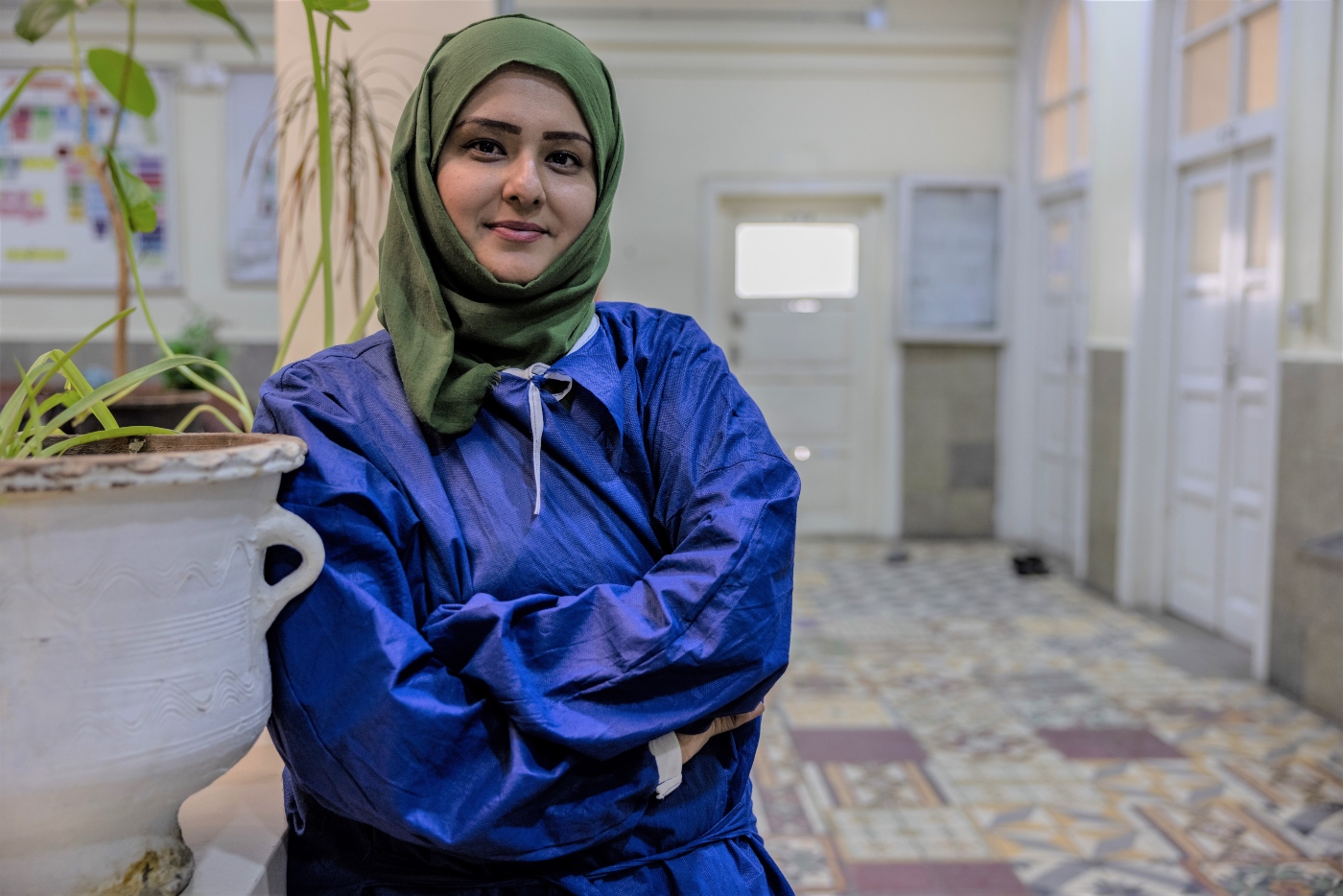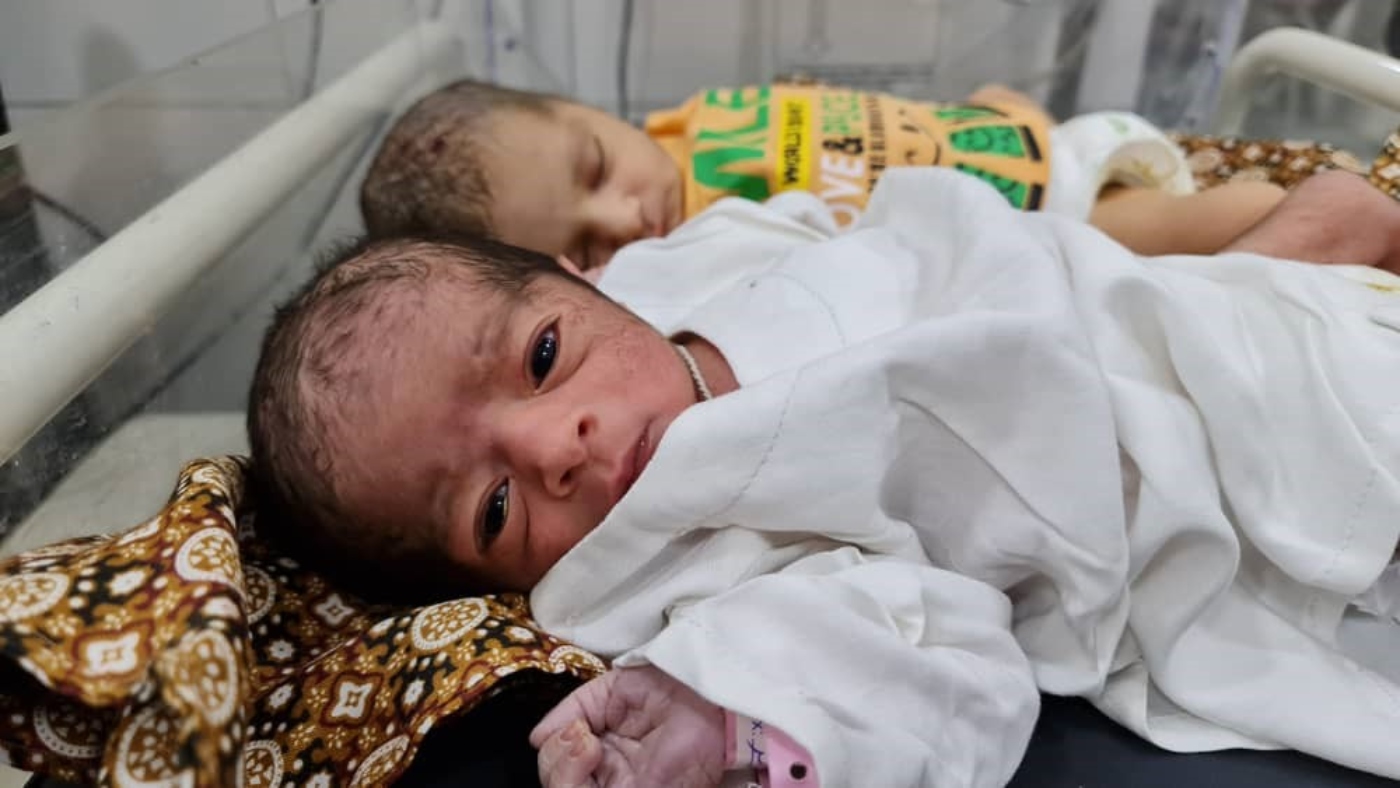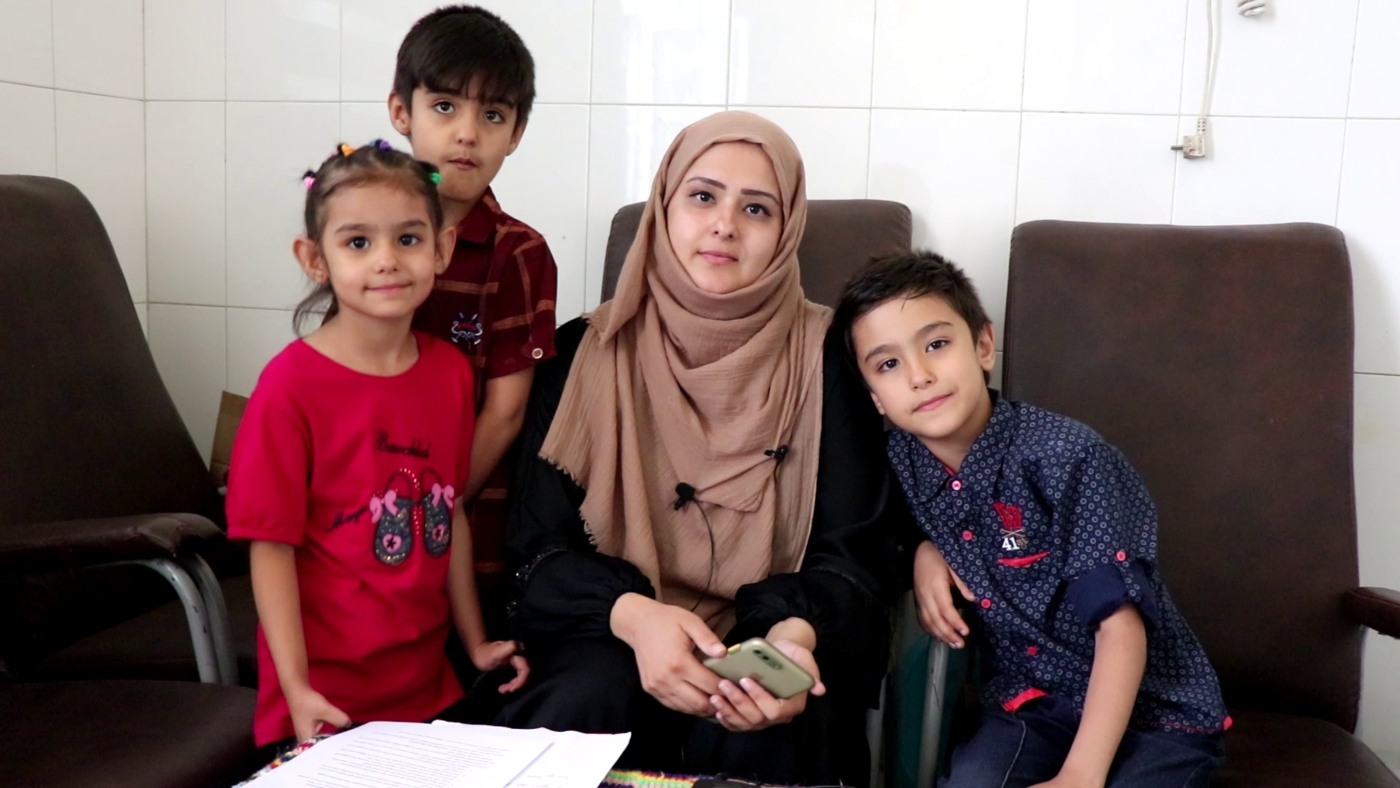Following the change of government in August 2021, most of the health workers in Afghanistan were no longer getting paid. Medicines were no longer available, and many health professionals deserted the country’s hospitals in search of incomes. As a result, patients were sometimes refused access to treatment and the overall healthcare system in the country was on the verge of coming to a full stop. In this episode, we ask, what does the future of sustainable healthcare look like in Afghanistan for those seeking lifesaving medical services?
We speak with Dr. Mariam Moksudi, a gynecologist at Rabia Balkhi Hospital in Kabul and one of the more than 10,5000 health care staff the ICRC is backing through the Hospital Resilience Project, which support 33 hospitals and nine medical institutions around the country.
Then we turn to Ana Lucia Bueno, ICRC’s health coordinator in Kabul, who explains how the ICRC has been supporting hospitals for decades and began the project after the change of government in August 2021.

Dr. Mariam Moksudi is a gynecologist at the Rabia Bal-khi Hospital in Kabul. She says it was her dream to become a doctor. Photo Credit: Mohammad Masoud Samimi/Rabia Bal-khi Hospital

The high maternal mortality rates are due to a number of factors like poverty, lack of access to health care, and education. Photo Credit: Mohammad Masoud Samimi/Rabia Bal-khi Hospital

Dr. Mariam says her four children are her main source of motivation and keep her going on a daily basis. Photo Credit: Mohammad Masoud Samimi/Rabia Bal-khi Hospital
Important Links
More than a 110,000 babies were born this year in Afghanistan, read more about how the ICRC is combating maternal mortality.
Read more about the Afghan health professionals saving lives at the 33 hospitals the ICRC supports.
This episode is now available for the hearing impaired.
SCRIPT
Mariam Moksudi always knew she wanted to be a doctor. She knew she wanted to help those in her community, especially pregnant women.
[MARIAM] “It was my dream to become a doctor.”
But over the last few decades, being a gynecologist in Afghanistan has become more difficult. Doctors like Mariam face insurmountable challenges: the COVID19 pandemic, scarcity of medical supplies, and then– the change in government. All while the need for medical care has skyrocketed, especially over the last year, according to Ana Lucia Bueno ICRC’s health coordinator in Kabul.
[ANA LUCIA] “After the change of government back in August 2021, the funding for development agencies and international financial institutions were stopped. So it interrupted many critical infrastructure projects in the country, including the field of health. In practice, this meant the immediate suspension of project salaries and payments, for running hospitals as well as maintenance. So right now, for us, we are trying, we are looking at it as a major a major crisis for the health system.”
After August 2021, most of the health workers, including Dr. Mariam, were no longer getting paid. Drugs were no longer available, and many health professionals deserted the hospital in search of incomes.
As a result, patients were sometimes refused access to treatment. The overall healthcare system in the country was on the verge of coming to a full stop.
[MARIAM] “I strongly believe that the international community will not let Afghanistan health sector collapse.”
On today’s show we ask, what does the future of sustainable healthcare look like for millions of Afghans desperate for care, and unable to access the most basic of services?
I’m Dominique Maria Bonessi and this is Intercross, a podcast that offers a window into the work of the International Committee of the Red Cross and shares the stories of those affected by war and violence.
[Intercross Musical Interlude Plays]
Dr. Mariam has been working at the Rabia Balkhi Hospital in Kabul for the past three years. Our colleagues in Kabul caught up with her at the hospital to hear her story.
[MARIAM] “My decision to become a doctor has mostly been influenced by prevailing family environment because my parents are both doctors. And due to that during my childhood, I was always witnessing that my parents had their work with their patients and like it was my dream to come become a doctor.”
[Sounds of hospital hallways with babies crying]
Rabia Balkhi hospital in Kabul has around 432 health care workers. Nearly 80% of them are female staff members, including doctors, nurses, midwives and trainees. In the hospitals maternity ward, up to 80 babies are born each day.
Yet in Afghanistan, of 100,000 live births each year, 638 women die. The country long suffered from the highest maternal mortality rate in the world. That figure could actually be much higher due to the lack of a well-established national database, especially in rural areas.
Those high rates are what drove Dr. Mariam to specialize in gynecology in the first place.
[MARIAM] “I have heard many stories mostly from the remote areas of Afghanistan, that poor woman because of unavailability of female health worker, they had died due to a very minor health mess up. So that is why I decided I dedicated my life to all poor woman, and through the health sector and becoming the gynecology was the best way to serve the well number sector of the society.”
Dr. Mariam witnessed this firsthand when she served for four years in the rural Paktia Province–roughly three hours southeast of Kabul.
She says the high maternal mortality rates are due to a number of factors like poverty, lack of access to health care and education.
[MARIAM] “As far as Afghanistan is concern, most of the people don’t take the pregnant woman for regular checkups to a doctor during her pregnancy unless she has a major health issue. The women are both in physical and psychological pain till they deliver.”
For many women, the question then becomes where can they deliver. Thousands of private health facilities closed or stopped functioning, after the Islamic Emirate of Afghanistan took control in 2021. Development agencies and States financing the health system disengaged at a time when healthcare and other basic services were in dire need.
Dr. Mariam says the private clinics that are left have become unaffordable.
[MARIAM] “In the current situation, there is not much affordable because most of them charge seven to 10,000 Afghanis for a normal vaginal delivery, which is a huge amount considering the current economic condition of the families.”
The cost is roughly 7-10 US dollars, but that is still out of reach for many Afghan families.
That’s due, in part, to the departure of those development agencies and states on top of an economy that was already fragile. The situation worsened by the effects of economic sanctions.
It was impossible to properly run the health sector.
Public servants’ salaries were not paid, generators lacked fuel. Ambulances didn’t run, there was no food for patients, or adequate medicine.
Dedicated and courageous female and male health staff have been doing their best to save lives every day, but without a functioning health system, their job has often been akin to putting a Band-Aid on a festering wound.
Dr. Mariam says what has kept her going in this tense environment are her four children–some of whom you might have heard in the background during this interview.
[MARIAM] “I have three sons and one daughter, the little angels are basically the main source of motivation that keeps me going on a daily basis. It’s a tense work environment but I’m lucky that I have full support of my family especially my husband, who is also a doctor, he understands my situation fully and completely support me support me in each and every step of my life and of course of my work life.”
[PAUSE]
The ICRC has taken immediate and concrete steps to save lives and keep health care facilities running.
In November 2021, the Hospital Resilience Project was launched. It supports 33 large hospitals across the country as well as medical institutes in nine provinces.
For a year now, the ICRC has been paying the salaries of nearly 10,500 health care workers—one third of them are women.
The funding also covers the running costs, including electricity and fuel for ambulances, as well as food and medicine for patients.
[Sound of babies crying]
Over the past year, more than 110,000 babies have been born with the support of these hospitals and the dedication of medical professionals.
The medical system in Afghanistan keeps running.
[MARIAM] “We hope that things start getting better. This sector is non-political sector and the international community has helped us so far through international institutions. And we hope that same continue in a more organized and a better manner. I strongly believe that the international community will not let Afghanistan health sector collapse.”
In 2021, the ICRC doubled its budget to 200 million dollars and expanded its operations. However, the ICRC also recognizes that humanitarian organizations cannot effectively replace a functioning public sector in the long term or meet the growing needs of the Afghan population.
Regardless of Dr. Mariam’s optimism, she’s still worried for her children’s’ future.
[MARIAM] “I have made a promise to myself that I will serve my people but not at the cost of sacrificing my children because they have the first and foremost right to be taken care of. I feel that if I leave Afghanistan, then I will not be the same person that I am today.”
[PAUSE]
To give you a better idea of the challenges the ICRC faces in maintaining these hospitals my ICRC colleague in Kabul, Mohammad Masoud Samimi speaks with Ana Lucia Bueno, ICRC’s health coordinator in Afghanistan. Ana has been with the ICRC for 10 years working in places like Gaza and South Sudan.
[MASOUD] Why is access to health care in Afghanistan a major concern for the ICRC?
[ANA LUCIA] “The country has been very resilient in many points, but still needs a lot of support. And right now we are facing face that we can observe in the country of huge economic crisis, especially in terms of nutrition. And these will lead to more and more health issues. And it’s very important to point that after the change of government back in August 2021, the funding for development agencies and international financial institutions were stopped. So it interrupted many critical infrastructure projects in the country, including the field of health. In, in practice, this meant the immediate suspension of project salaries and payments, for running hospitals as well as maintenance. So right now, for us, we are looking at it as a major a major crisis for the health system.”
[MASOUD] How long has the ICRC been supporting health care facilities in Afghanistan?
[ANA LUCIA] ICRC has been supporting healthcare facilities in Afghanistan in the last decades, to be honest with you, I mean, we have a very, very long project in the south of Afghanistan Mirwais Hospital in Kandahar, which we support since 25 years. We also have a long project in supporting basic health care centers in cooperation with Afghan Red Crescent for quite some time now. And most recently, when the shift of government happened, ICRC is started supporting 33 secondary hospitals structures in the country, they are the big the biggest ones. We support is about 26 million people who benefit from from these this new project that ICRC put in place.”
[MASOUD] What sort of challenges does the ICRC face in supporting these facilities?
[ANA LUCIA] “In late 2021, one of the main challenge back then was to put together a support which would maintain the system working but also would not create a parallel system to the country. The country has its own protocols system in place. So we really look forward to have a partnership with the authorities, the health authorities in country you know to keep providing them I mean to keep the idea of ownership on the ministry and the technical people inside the ministry, for instance, the Department of curative medicine, the Department of quality of care. So for us, one of the challenges we encountered the beginning was the country was sponsored for by different donors in the past, and now they have gone. For instance, very simple on hospital management is like the, the standardize salary lists, you know, with all personnel has cross across the board, the same salary, they have the grading system. So we try, we worked a lot together with the Ministry of Public Health specially to create this, these standardized salary list for all health workers in Afghanistan, working in the hospital sector. This has been one big challenge for us. But now we are on the face of fine tuning, you know, all the list of these 10,500 Health staff that we support. Another big challenge we had, was in regards the supplies of drugs and as well, consumable for the hospitals, and also to get engaged with the hospital directors on the 33 hospitals. So we could work with them in terms of consumption in terms of what are the real needs in the field.”
[MASOUD] How has the economic crisis affected the health sector more than a year on?
[ANA LUCIA] “The sanctions imposed in the country, definitely, they impacted the delivery of basic service including the health services…[08;26-09;53] What ICRC is doing at this moment is really an emergency response to allow the hospital system to continue providing the services. Without the ICRC support, I can tell you the hospital system would have been put in a standstill and millions of people would have been deprived from hospital care. This is the fact the sanctions make the life more difficult, you know, for the delivery of basic service, I have no doubts about it, because Afghanistan is a country that had systems before has been supported before and and very quickly the support has gone and now that that services which used to run they are having very many difficulties to keep running. For one example like ICRC we support the basic The Basic package, you know, which is to treat the main disease in the country, but specialized services are still uncovered. For instance, oncology, oncology services or hemodialysis services. These services are still not fully available in country because of very specialized and ICRC does not yet have the capacity to also cover this part of the health system.
[MASOUD] Is there a plan to hand over these facilities to the Afghan government once they are able?
[ANA LUCIA] “Since the beginning of the hospital support this, we have also this idea as an exit strategy for us is to handover. The project handover the, the hospitals back to the Afghan government.…and this will only be able when the government is able, you know, to to resume the payments of salaries, the supplies of drugs, and the supplies for I mean, the the maintenance of this hospitals because the hospitals, Afghanistan has a very harsh winter as we know. So the hospitals they need, they need heating, they need fuel. They need water, you know, safe water. So the moment the way we were managing this project hand in hand with the health authorities and health, technical personnel, I believe they the moment ICRC is about to step out, the authorities who have the full technical knowledge to retake the thing institutions and keep managing it.”
[MASOUD] Do we have an idea of when that will be?
[ANA LUCIA] “The ICRC does not exactly know when it will happen. And this is an open question. I believe at the moment, we understand the whole situation in Afghanistan is still very fluid. So still, you know, things needs to be organized. And it’s very early for us to say when we’ll be able, you know, to withdraw this very consistent financial and technical support. But one thing we commit to is that while the needs are there, in this regard, ICRC will support the health system in Afghanistan.”
That was Ana Lucia Bueno being interviewed by Mohammad Masoud Samimi.
And it’s important to note: Earlier this year, ICRC’s then President Peter Maurer warned that the gains in maternal and child health made in the past could be at risk of being lost if the international community doesn’t step into support.
To prevent the situation from further deteriorating and ensure that the Afghan people have access to critical and lifesaving services, development agencies and States are encouraged to resume their investments in Afghanistan.
Thank yous this week go to all the hard work of my colleagues in the ICRC delegation in Kabul.
If you’d like to learn more about the doctors and other medical staff in Afghanistan you can take a look at our website, that’s intercrossblog.icrc.org. There you can subscribe to our newsletter so you never miss a podcast.
You can also follow us on Twitter @ICRC_DC and on your favorite podcasting app.
See you next time on Intercross.

